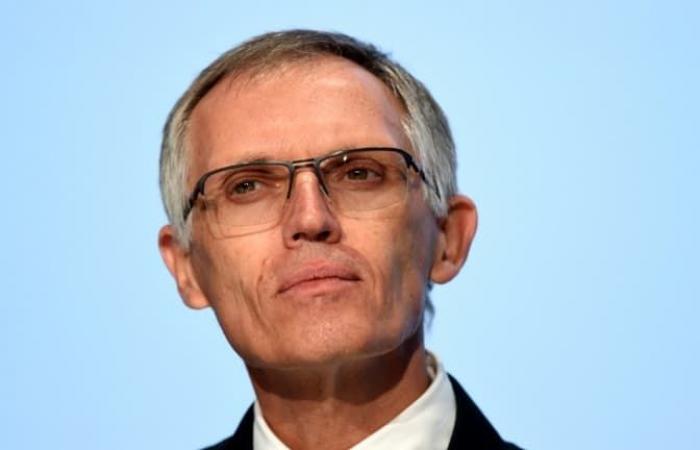The boss of Stellantis resigned on Sunday with immediate effect. Its board of directors was wondering about a reconsideration of its electric strategy.
“He understood that he no longer had the power and slammed the door.” It is with this little sentence that someone close to the boss of Stellantis sums up his surprise resignation. In recent weeks, relations between Carlos Tavares and his board of directors have become strained.
Everything changed last Friday when he informed him of his decision. As a matter of urgency, President John Elkann and independent director Henri de Castries decided on Saturday the new governance to adopt: the heir of the Agnelli family, which owns 14% of Stellantis, becomes CEO. And immediately summoned the other administrators to ratify this interim leadership on Sunday while waiting to appoint Carlos Tavares' successor in the first half of 2025.
Two months ago, John Elkann pushed him to retire at the end of his mandate, at the beginning of 2026. But that was not enough for the president of Stellantis who has since continued to challenge his general director. “The council got involved in day-to-day management and questioned its orientations,” explains one of those close to him. “Carlos understood that the year he had left would become a nightmare.” Carlos Tavares does not share power. And this has been going on since 2013, already at PSA, he was managing alone.
Questions about electric strategy
So when John Elkann questions him about his strategy, things stick. The president of the group reviews all the major strategic reflections. “Different points of view have appeared”, as the former CEO of Axa, Henri de Castries, soberly acknowledged in the press release published on Sunday which recorded the resignation of the boss of Stellantis.
First on the 2035 deadline for banning the sale of thermal vehicles in Europe. Carlos Tavares opposed the European manufacturers, Renault and Volkswagen, who were campaigning to push back the fateful date. John Elkann wonders whether we should not follow them and stand together with our competitors against the European Commission rather than going it alone.
Carlos Tavares also refuses to postpone the application of environmental standards for CO2 emissions (Cafe) while the automobile sector lobby – chaired by the boss of Renault – is in favor. He promises that he will not need to buy carbon credits to meet European obligations. The chairman of the board of directors doubts and questions his general manager.
Tavares accelerates, Elkann brakes
The boss of Stellantis, always sure of himself, wants to accelerate towards the electric transition. He even recommends embarking on a new merger to be even bigger and further lower costs. “In the medium term, he thinks that continuing the race for size is the only solution to resist Chinese competition,” explains one of his friends.
But John Elkann no longer follows the self-proclaimed “performance psychopath”. It seems more conducive to calming things down, and concerned about the recovery of the stock price of Stellantis which returned to its IPO level in 2021. The former owner of Fiat is above all a capitalist concerned about his assets . He only has 14.2% of Stellantis but with twice as much capital as Peugeot, he is the only one to oppose Carlos Tavares.
Did he push the European automobile star to his limits to provoke his resignation?
“John Elkann's questions were sincere and legitimate, judges a good connoisseur of the group. He did not expect his reaction.”
But “Carlos Tavares is not the type to change his mind, recognizes an executive who worked with him. He's a sanguine person.”
We repeat the session: “Departure of Carlos Tavares: a blessing in disguise for Stellantis?” – 02/12
The Peugeots let it happen
His resignation came as a surprise at all levels of the group where most of the leaders learned of it… in the media. Even the Peugeots were not informed of the news. Family executives were also due to meet him this Thursday to discuss Stellantis' strategy. A headhunting firm had just been commissioned to find his successor. “We did not feel any acceleration in his departure,” explains a source close to the family. “Robert Peugeot was not involved.”
He who seeks to defend the patriarch in reality reveals his passivity.
“The Peugeots did nothing to stop the standoff and lined up behind the Agnellis, confirms a close friend of Tavares. The one who saved PSA from bankruptcy did not have their recognition.”
The timing is striking. Ten days ago, the family turned an important page in its history. Over the past two years, their holding company Peugeot Invest has suffered financial difficulties due to its investments in Orpea and the real estate developer Signa. Robert Peugeot passed the baton to his son Edouard who will manage the family company. This forty-year-old, who comes from the world of investment capital, will manage the 7.5% share of Stellantis as a financial holding. Like John Elkann.
Matthieu Pechberty Journalist BFM Business






